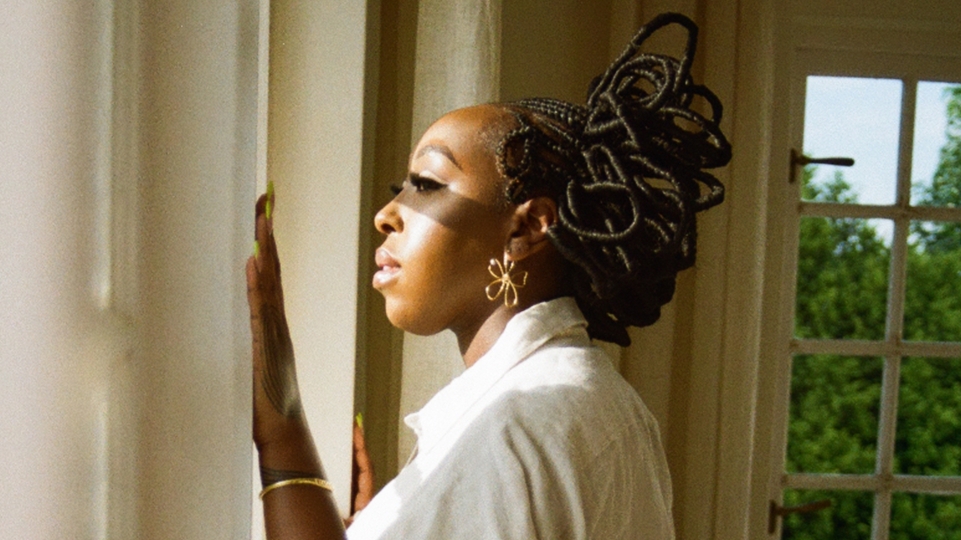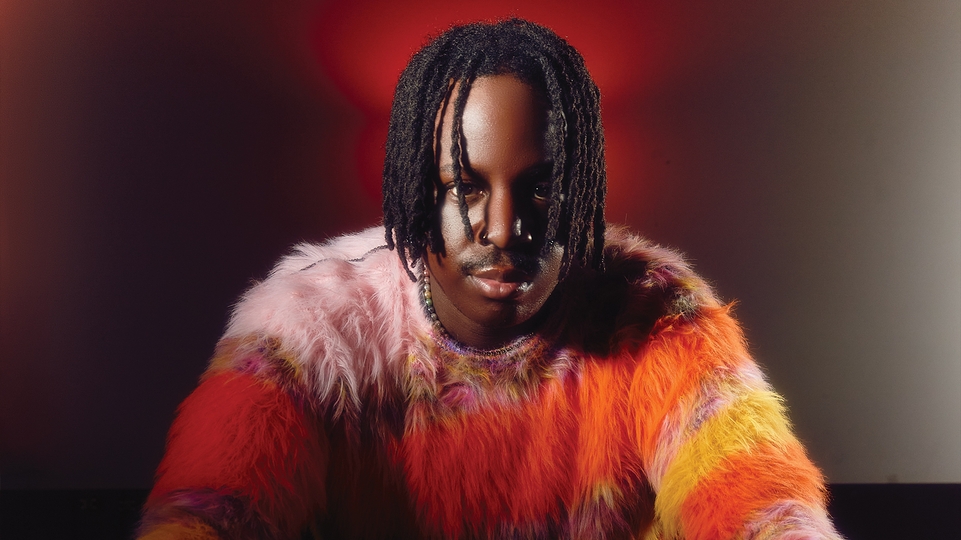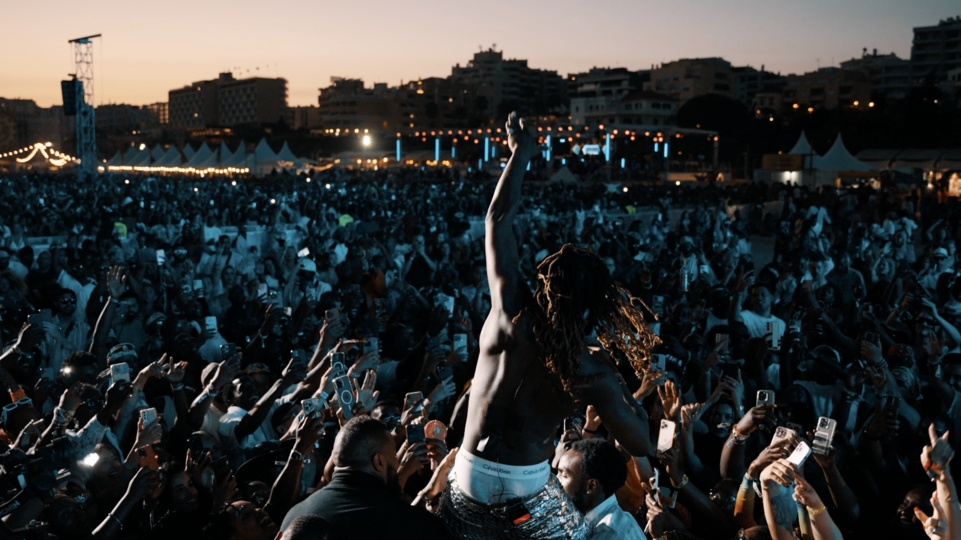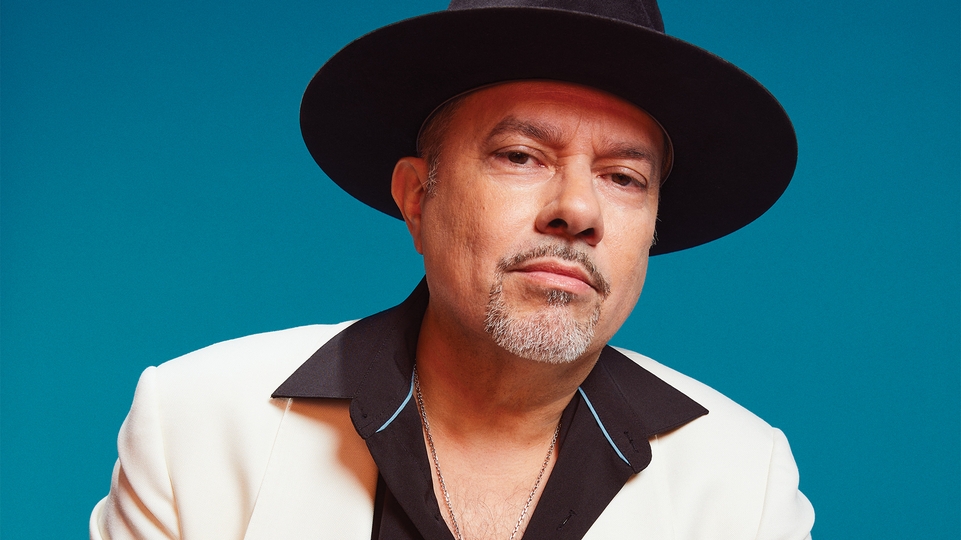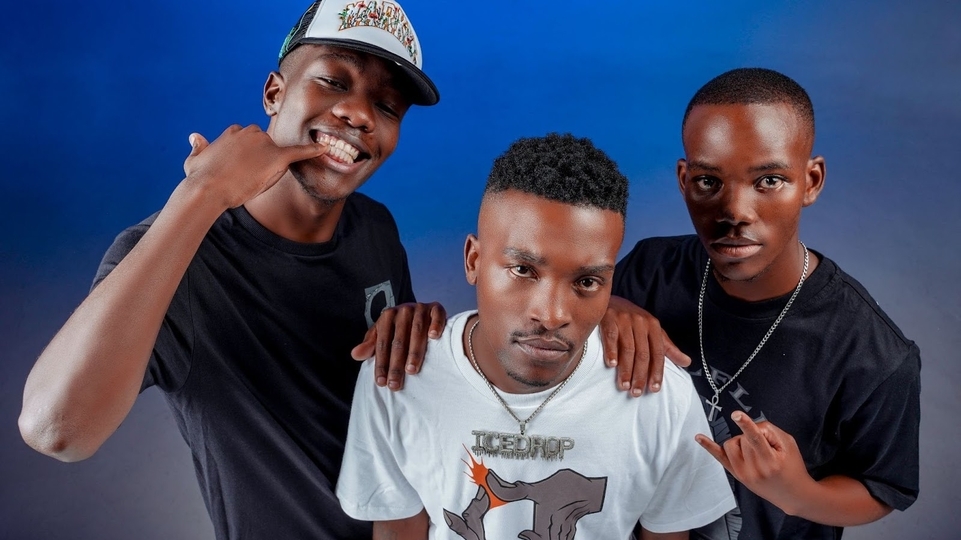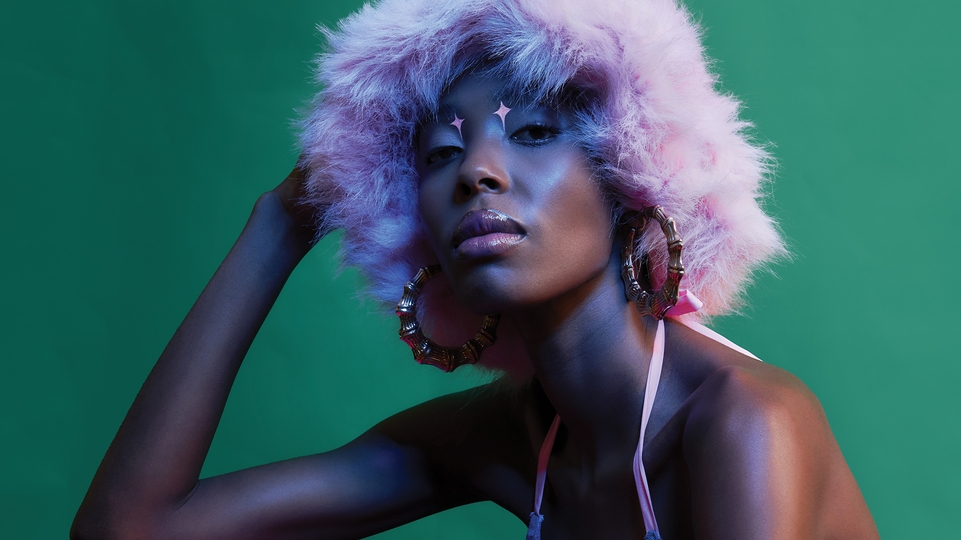
DJ Lag: the gqom king conquers the globe
Durban’s DJ Lag is a pioneer of the world-conquering South African dance music genre, gqom. He’s toured the world and worked with superstars, but he’s also fought battles – against copycats, at home and abroad, and a changing dance music scene. Ahead of his debut album, ‘Meeting With The King’, he talks about how these battles, and South Africa, have made him, and how he’s looking to the future, by blending gqom and amapiano
In 2017, during his 21st rotation around the sun, DJ Lag was experiencing a moment that every artist dreams of but few ever reach. Gqom, the sound he’d been perfecting for nearly a decade, was finally getting its due recognition from the rest of the world, and he was the face of it. The DJ and producer had come a long way from tinkering on FL Studio at home in Clermont. He’d spent several more years testing out the sound in Durban’s teenage house party circuit, and finally disseminated it in nightclubs all over South Africa.
In July of 2017, he released ‘Trip To New York’, a brief and vivid trio of sgubhu tracks that he had made while on the road. Sgubhu, gqom’s radio-friendly cousin, filters out the menacing undertones of the Durban club genre in favour of something more accessible — with bright melodies, less emphasis on gqom’s characteristic broken beat, and often catchy vocals to tie it all together. The EP was anchored by the title track, an instrumental that builds around a deceptively simple synth pattern that’s impossible not to dance to.
In the midst of the EP’s release, Lag was touring relentlessly, racking up shows and new fans in places further and further from home: Poland, South Korea and the United States are just a few of the many passport stamps he accrued that year. Consequently, he was barely in South Africa, primarily passing through for just a few days to handle visas and the like. In the span of a year, he went from having never left South Africa to adopting London as a second home, a place where he could keep his things as he prepared for more shows in Europe.
The cost of Lag’s mounting success in the West was that he became alienated from the larger gqom scene in South Africa. In 2016, Babe Wodumo’s ‘Wololo’ and Okmalumkoolkat’s ‘GQI’ became gqom’s first radio hits, making the sound mainstream, and its producers — many of whom Lag had come up with — hot commodities. But in an odd twist of fate, Lag’s releases were struggling to make it out of the underground. Massive Q of Rudeboyz, who produced ‘GQI’, told us that “At that time, Lag’s music wasn’t having a huge impact in South Africa. It was a bit hard for him to break through.”
For Lag, the discrepancy between his rising star abroad and his diminishing one at home was difficult to accept. Like Msawawa and Big Nuz, the kwaito stars he’d grown up listening to, he yearned to be a household name in the country. So it came as a surprise when just a few months after its release, ‘Trip To New York’ blew up back home. The only problem was that the song, save for some minor changes, was released under a different name, and DJ Lag’s name was nowhere to be found in the credits.
‘Omunye’ — released by Distruction Boyz and featuring Benny Maverick and Dladla Mshunqisi, as the star single off their debut album ‘Gqom Is The Future’ — was more than just a hit song. It became a cultural moment. Over a nearly identical instrumental of Lag’s track, the local gqom stars amped up the original’s danceability with pithy, party-starting lyrics and adlibs that took the track from already great to explosive.
The music video for ‘Omunye’ has logged tens of millions of views to date, and in early 2018 became the soundtrack to a Black Panther dance challenge on social media. For Distruction Boyz, who had already established themselves as hitmakers by producing Babes Wodumo’s ‘Wololo’, the song launched them to continental heights as they toured all over Africa, widening gqom’s reach and demographic.
In 2018, the song had its victory lap at the 24th annual South African Music Awards, when it picked up Record Of The Year. In a 2019 interview with Afropop Worldwide, Que of Distruction Boyz noted of the hit record, “We commercialized gqom. That was a major, major breakthrough for the gqom movement. Us taking the sound and making it something you can jam to even on a Sunday morning, not just when you’re going out to a party.”
For Lag, the moment was shocking and disappointing. “I’m sure those guys knew the track that I did, because we were friends back then. We used to play the same gigs with each other and we used to do studio sessions together,” he tells us over Skype from Durban. “I think they were just taking advantage of the fact that I was touring a lot so I wasn’t going to notice what was happening in South Africa. I wasn’t that famous in South Africa, not like Distruction Boyz. People thought I planned for that whole thing to happen so that I could get popular.”
Distruction Boyz and their manager DJ Tira claimed they bought the beat from a producer in Cape Town, DJ Mphyd, who at the time denied any wrongdoing. This led to a three-and-a-half-year-long legal battle that ultimately confirmed the copyright violation, and resulted in Lag getting his appropriate credit. Today, Lag doesn’t harbour any bad feelings towards the parties involved and has resumed working with Distruction Boyz and Tira. “Me and the guys were able to squash what was happening and forgive each other. We became friends again and started making music again,” he says.


“I always used to think that I was loved more internationally than here. But after the will.i.am thing, I saw that South Africans really love me. Maybe it’s just that they’ve never shown it before."
Culture Vultures
Fast forward to November 2020, and Lag found himself in a similar position — another one of his tracks had been stolen. It was a much older track, and the culprits were not hometown peers but American artists. By this point, though, things were very different.
For one, Lag had released a song with Beyoncé — even your worst enemy has to respect that. Secondly, the pandemic had forced Lag to be home for the longest stretch of time since 2016, and he took advantage of it by re-establishing himself in the scene at home. In fact, he was gearing up for a collaborative release with DJ Tira when he found out that DJ Megan Ryte and American pop producer will.i.am had lifted one of his early gqom hits, ‘Ice Drop’, for their track ‘Culture’ (ironically, the latter’s title takes its name from the term “culture vulture”).
Another key difference with this episode was the response from South Africans. They didn’t leave Lag on the margins, but instead delivered him the hometown glory he’d always wanted. Their cries of outrage on social media brought ample media attention to the situation, which led to a takedown of the track, a relatively swift apology and settlement from the offending artists.
To be fair, there were a lot of other factors that made the ‘Ice Drop’ situation different. “It’s an old track, it was played around Durban around 2013 before it got released under Goon Club,” Lag tells us, “so the whole of South Africa knows that track, it was one of the biggest tracks when gqom was rising. It was the first gqom music video on MTV Base. It was a big thing.”
But in an interview with OkayAfrica soon after the whole debacle, Lag admitted, “I always used to think that I was loved more internationally than here. But after the will.i.am thing, I saw that South Africans really love me. Maybe it’s just that they’ve never shown it before. The amount of support I got during that whole thing showed me that.”
Since Lag first left South Africa in 2016, the tension between gqom’s development within and outside of the country has profoundly affected his career. While his celebrity ascended away from home, earning him shows and festival placements alongside the biggest names in electronic music, he couldn’t get gigs back home. While he continued to electrify international audiences with some of gqom’s rawest and darkest cuts, the lighter sounds of sgubhu were making inroads in South African pop, relegating the genre’s rougher sounds to the underground. And when the pandemic forced him back home in 2020, the markedly slower and more melodic sounds of Joburg’s amapiano and West African Afrobeats had taken over the South African mainstream, threatening to push gqom into obscurity.
His debut album, ‘Meeting With The King’, due for release on November 5th on Ice Drop/Black Major, is Lag’s attempt to resolve and transcend these tensions in the music. The expansive record is a bridge between the sound of gqom’s early days and the genre’s evolution from sgubhu to an exciting new mash of gqom with amapiano that Lag is pioneering, alongside the latter genre’s stars: Mr. JazziQ, Lady Du and the late Mpura. It’s an ambitious effort that, frankly, only Lag could pull off. He thinks so too: “In my entire career, my entire life, this is the moment that I was waiting for.”
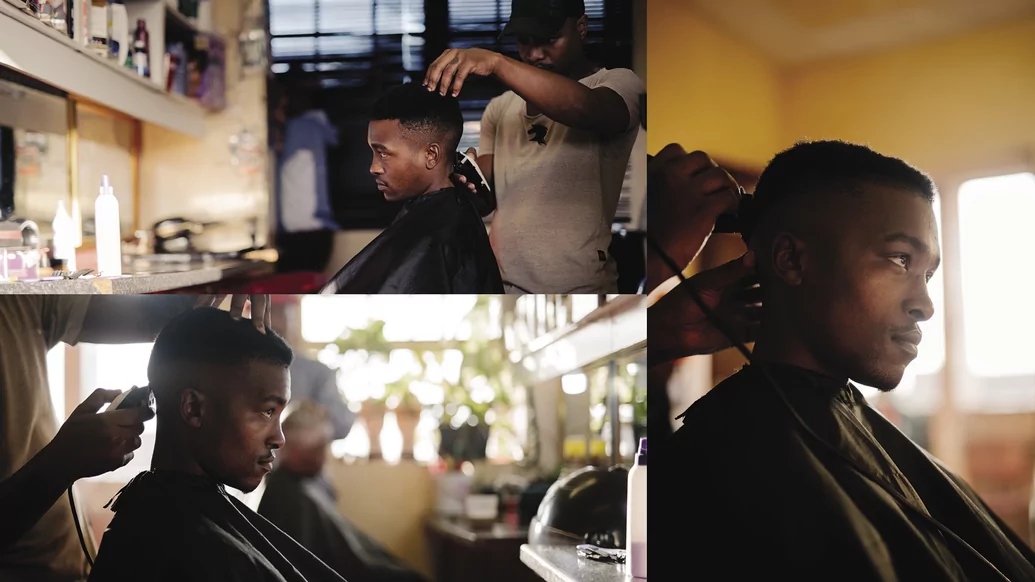
Shifting Course
Lwazi Asanda Gwala was born in 1995 in Clermont, one of several townships that surround the South African city of Durban. During apartheid, Clermont was the only place in Durban where Black South Africans could buy property and build homes. By the time Lag was growing up in Clermont as part of the Rainbow Generation, the children born in the years immediately following apartheid, the township was characterised more by the kinds of socio-economic conditions that lead to theft and its often fatal consequences rather than ownership.
“It was rough, rough, rough,” he says. “Stealing cars was like fashion. When you were in high school, there were always going to be friends trying to get you in one of those hijacking gangs. People were dying a lot when I was in high school.”
A series of extracurricular activities kept Lag just out of reach from the forces that kept other young kids in his neighbourhood teetering towards trouble. First it was football, then dance. Then after an ankle injury, it was music. He was given a copy of FL Studio a year before he had a personal computer to use it on, but even with limited resources, opportunities to practice and observe the music-making process were abundant.
Hip-hop wasn’t working out for Lag and pragmatically, he shifted course. “I don’t think I remember even one hip-hop beat I made because nobody wanted to listen to that,” he laughs. Around this time, as the first decade of the 2000s came to a close, Culoe De Song and Black Coffee were ushering in tribal house, unseating kwaito as the sound of South African dance music, so Lag decided to try his hand at it.
What happened next are the details repeated so frequently in gqom’s origin story, they are bordering on mythology: the broken beat revolution was ignited by the Naked Boys’ track ‘Ithoyizi’, and a crop of producers popped up in different Durban townships in an effort to replicate what Naked Boyz had done, including Lag, Rude Boyz and Sbucardo Da DJ. The budding genre started to spread in WhatsApp groups and among high school students. Then came the push from Durban’s infamous soundsystems-cum-taxis, before it was baptised a club sound in Durban hotspots like 101, Havana and Spank by their resident DJs — Dlala Thuksin at 101, Rude Boyz at Havana, and Lag at Spank.
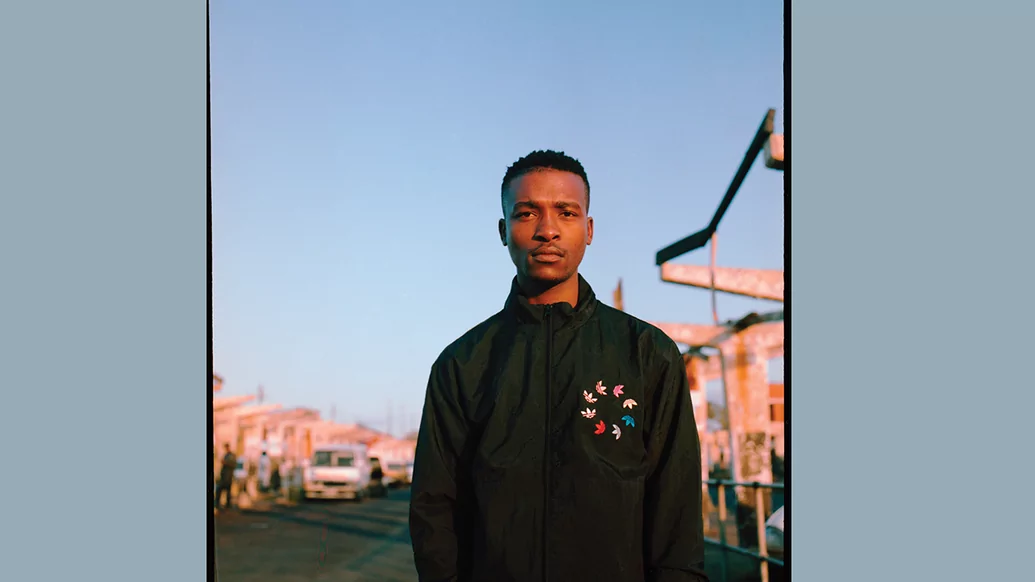

Durban To London
Lag was around 14 years old when he first started making gqom. Because no one else was making it in Clermont, he spent a lot of time alone in the studio, testing out new techniques and experimenting with fresh sounds. He got connected to the larger gqom scene through WhatsApp groups and later by DJing at high school parties and clubs in town.
“I still remember the first gqom track I made. It’s called ‘Crash’,” he recalls. “I went to a matric dance party and I was supposed to DJ. And when I went to that house party, like, all the cars were playing my music.”
A well-known DJ in Clermont, fittingly named Tempo, started taking Lag with him to his sets at a club called Uhuru, giving the young high school student an opportunity to develop his skills behind the decks. “We used to play there early! And that’s when people started recognising me, ‘Oh, this is DJ Lag’. People started following me more, and I started getting other shows in town and different townships.”
On those early days in Durban, Que of Distruction Boyz remembers, “I started listening to Lag’s music prior to meeting him, as it was already moving on the streets. So at the time we met, I was a supporter of his music. He turned out to be a genuine person.”
The club scene encouraged a little competition between the different gqom producers, but they bonded and became friends, because ultimately they all just wanted to make the sound as big as it could possibly be. “We didn’t think of making money out of our music. We just wanted to get our name out,” says Lag.
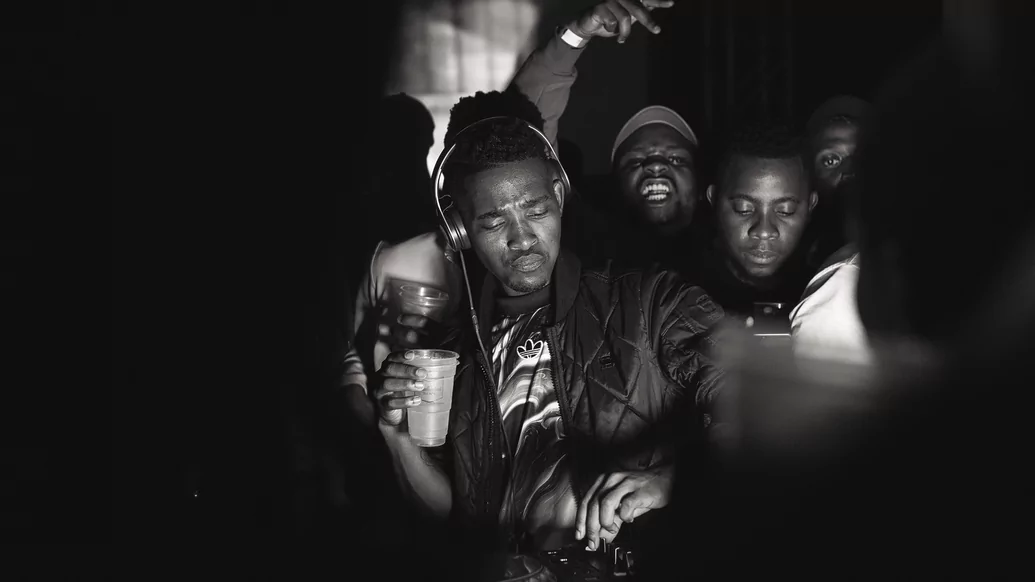
While gqom infiltrated Durban and its environs through closed circuits — public transportation, house parties, group chats — the internet, mp3 blogs and South African musical ambassadors with foreign connections, like Spoek Mathambo and Okmalumkoolkat, made it accessible to anyone outside of South Africa who happened to be curious enough. In grade 10, Lag got a message from one such person in Europe.
“A guy from London. He told me he has my music, that people are playing it a lot on that side [of the world] and he wanted me to release an EP under his label.” This guy was Kamran from Goon Club Allstars.
“First time I heard his music was wild — so unlike anything else I was listening to,” Kamran remembers. “What I liked was that there was a vague sort of familiarity within it; the lineage of South African house music and its echoes within UK funky made it tangible for me. Like recognising something is going to work well within DJ sets and whip a dancefloor into a frenzy. ‘Ghost On The Loose’ really did that for me.”
This was around 2010, and that moment proved to Lag that he could actually make a living off music. But it would be another six years before his debut self- titled EP came out under Goon Club Allstars. Initially he was a little suspicious, but internet issues impeding file uploads and resistance from his family proved to be much more formidable obstacles than his own hesitancy.
“Family-wise, I wasn’t getting any support, because I was starting to lose control and not focus on my schoolwork. I had already started playing in clubs, and I just saw school as a waste of time. That’s when I started failing my classes. I failed twice, and then my mother tried to take me to boarding school. They took my computer away. I had to run away from home and go to my auntie’s place.”
After two months at his aunt’s house, he reconciled with his mother and went back home. She found him another school where he finished his matric, the final roadblock in his budding music career. “When I finished, that’s when they told me, ‘Okay, you know what, you can do whatever you want now’.”
Lag wasted no time, signing with his current management group Black Major, and booking gigs all over South Africa. His first show outside of Durban was in the Eastern Cape, one of the first provinces that took to gqom. “It was crazy,” he remembers. “When I went there, everybody knew who I was, but they hadn’t seen my face.”
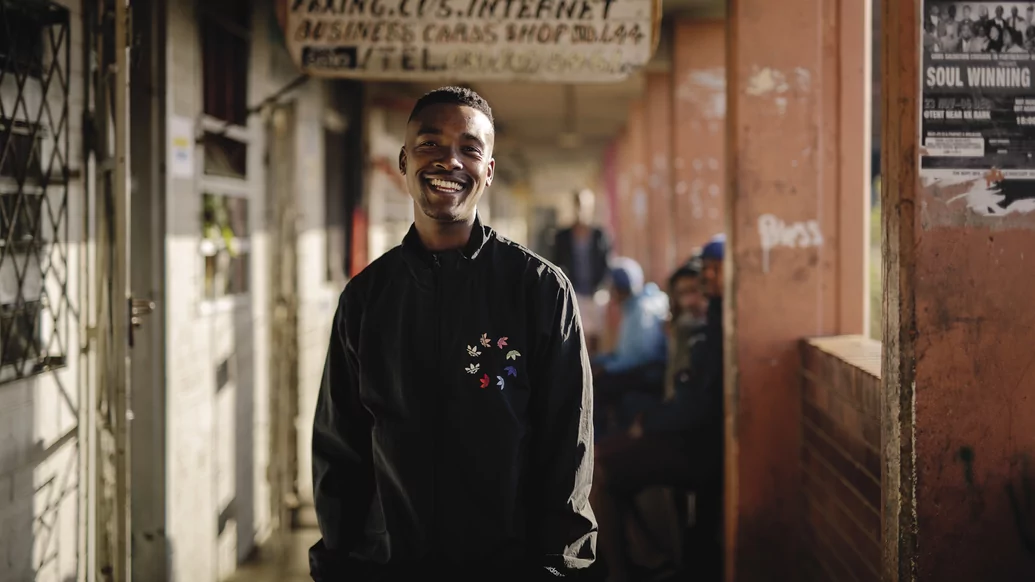

“Seeing a lot of white people dancing to my music was crazy. It was my first time experiencing that. In South Africa, most of the people that like that sound were Black people. And when I went overseas, it was different. That’s when I realised, ‘Okay, I think I’m going to be big on this side [of the world].”
International
In 2016, the grittiness that characterised gqom of the early 2010s started to give way to sgubhu. Even Lag, who much prefers the harder sound, started producing it. That year, Babes Wodumo and Mampintsha hit gold with ‘Wololo’, gqom’s first mainstream hit; all of a sudden, gqom was on the radio. By the end of that year, Lag released his EP with Goon Club Allstars, a selection of sparse and potent gqom instrumentals, after which he left South Africa to tour. His leaving was facilitated by Italian DJ and label head, Nan Kole of Gqom Oh!. He met Lag in March of that year and while putting together a promotional tour for the release of his first compilation, organised for Lag to join him.
“I heard around Durban about his DJ skills,” Kole tells us. “He started very young, playing in one of the most famous gqom clubs in the city as well as in local township parties in Clermont, and for an international tour on that level, that was an important factor.”
To Lag, it was less obvious that he should be the one to go on tour. “I wasn’t signed to his record label. He just decided out of nowhere that he wanted to do a tour with me, and it was my first tour. He paid for everything, like my flights. I was staying with him in Italy. He provided food every day. I didn’t have money at that time. China, South Korea, Italy, Poland, Switzerland, London — it was crazy. I’ll always thank him.”
That first tour was two months long, and the reception at his first show at Unsound Festival in Poland was more than Lag could have imagined — especially the make-up of the crowd. “Seeing a lot of white people dancing to my music was crazy. It was my first time experiencing that. In South Africa, most of the people that like that sound were Black people. And when I went overseas, it was different. That’s when I realised, ‘Okay, I think I’m going to be big on this side [of the world]. That’s when I got more motivation, after that show.”
The first tour immediately led to a tour in the United States, then back to Europe for more shows. On the festival circuit, he went from brushing shoulders with big stars to working with them. In 2018, after sharing a bill with M.I.A at Sakifo Festival, she asked that he change his flight so they could work together (the song remains unreleased).
These shows made an impression back home. “The opportunity Lag got to work with bigger artists from Europe and the UK led him to be known,” says Massive Q. “Lag played a good role in gqom and Durban.”
“Lag’s role has been massive in the gqom space, especially underground,” Que tells us. “How he has stayed true to the sound is something that is commendable, especially with the changes in what’s hot in South Africa. He has assisted in also moving the sound internationally, creating more opportunities for other sound pioneers.”
Given Lag’s position in 2021, hindsight can often appear rose-tinted. But back then, Lag’s international success wasn’t registering and he felt it acutely. “I was separated from 2016 to now. Some people didn’t even know who DJ Lag was in South Africa. But I was big outside. When I was on this side (South Africa), I was only staying for like a week and I wasn’t playing shows, I don’t know why. People weren’t even trying to book me. I think they were assuming that I was expensive. I don’t wanna lie, I didn’t like it.”
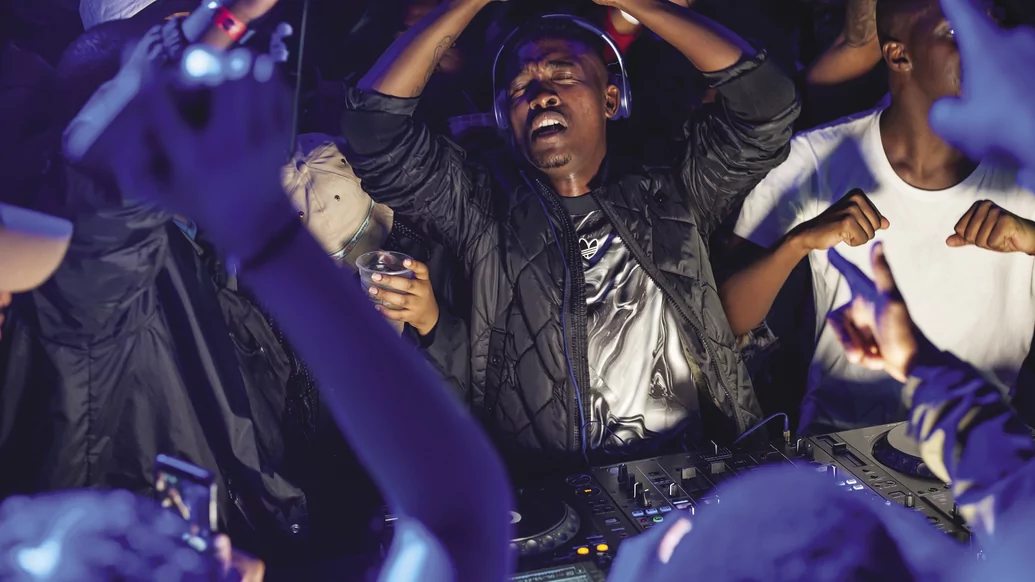
Beyoncé
In January of 2018, Lag and his management team began their efforts in earnest to legally challenge his missing credit on ‘Omunye’. Within a month, a forensic copyright investigation confirmed that the two songs were practically identical, but an ensuing game of pass the blame did little for Lag’s credibility at home. By the end of 2018, however, the tides would change, when Beyoncé and Jay-Z performed at Global Citizen Fest in Johannesburg. As background music to their grand entrance, they chose none other than ‘Trip To New York’.
A few days later, Lag was contacted by the pop queen’s team to submit tracks for a project she was working on. He sent over a few beats and the standout ended up being ‘Drumming’, a track he had released on ‘Stampit’, a 2018 EP with Goon Club Allstars. Then, in early 2019, he found himself in Los Angeles arranging some vocals for the track. The next time he heard it, ‘My Power’ featuring Nija, Busiswa, Yemi Alade, Tierra Whack and Moonchild Sanelly, had been released as part of ‘The Gift’, an accompanying album to 2019’s star-studded ‘The Lion King’ remake.
“Everyone in South Africa started recognising me because of the track that I did with Beyoncé,” Lag remembers, “Ever since, they’ve been approaching me; and they want to work with me.”
Fame is fickle and doesn’t always land on the deserving. Money, influence and power can often benefit those who need it least, but the few times a hefty co-sign feels deserved, the taste is sweet. Lag took advantage of this vindicating moment to deepen his connections at home and broaden the genre’s reach by connecting with larger distribution platforms.
That same year he released an EP, ‘Uhuru’, on Good Enuff, an imprint of Diplo’s Mad Decent label. The project is a callback to the hard sound of gqom’s early days, and its name pays homage to one of the Durban gqom clubs where Lag found his way. It’s also one of the first times that Lag has featured another gqom producer from Durban on a release: Unticipated Soundz, a young collective signed to Lag’s label Ice Drop. He closed out the year partnering with Boiler Room and Ballantine’s to livestream an event he’d been putting on in Clermont since 2016, aptly called ‘Something For Clermont’.
“That event in 2019 was huge. It was the first time Boiler Room had come to Durban, and they came to my hometown, to my event. The whole world was seeing that, and that was one of my biggest achievements, you know. Seeing people from overseas recognising events that I’m doing here, it was crazy.”
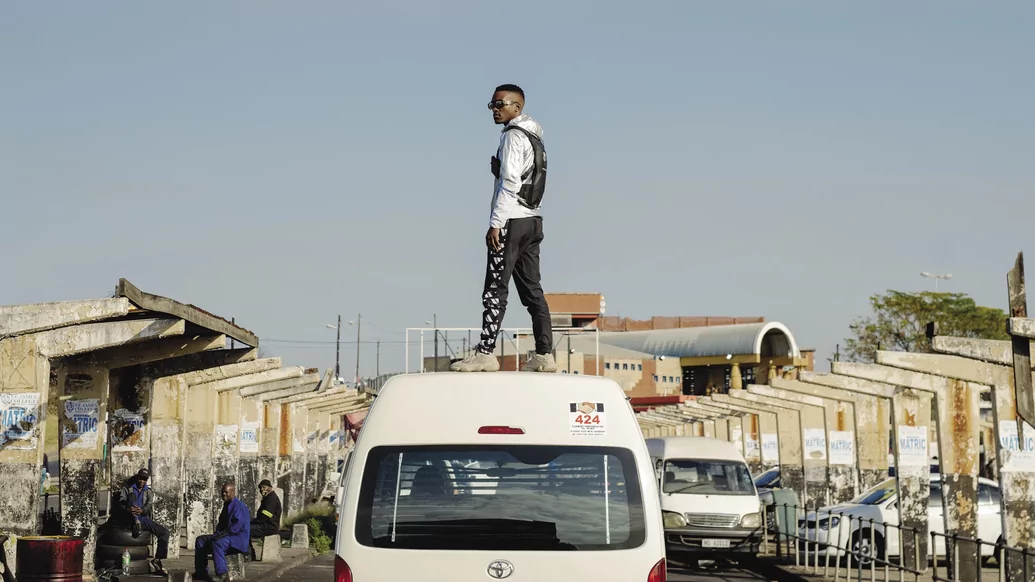

“I just keep going and keep making music. I want to keep the sound growing, to keep it alive”
This local momentum, coupled with pandemic-induced tour cancellations, put Lag in album mode. He realised that the moment was right to release something. He put out a few feelers through two collaborations in 2020: ‘Samba Ngolayini’, a sgubhu crowd-pleaser featuring an all-star line-up, and ‘Siyagroova’, an equally fun collaboration with DJ Tira. They both did well, but ‘Samba Ngolayini’, which came alongside a slightly ridiculous dance challenge that involves balancing beer bottles on one’s head, took over South Africa’s dancefloors, Covid-19 be damned.
“That was a huge, huge, huge track. I started playing a lot of shows. Like the shows that I do when I’m touring overseas, now I’m doing them in South Africa. And I was getting paid good money.”
The other force that influenced Lag’s desire to make an album was the unstoppable ascent of amapiano, the slower Afro-house sub-genre characterised by charging log drum patterns, its affinity for breezy melodies, and a pace caught in-between the groovy vibes of kwaito and the frenetic energy of gqom. Lag wasn’t so much threatened by amapiano’s rise as challenged by it. He became interested in trying to find a way to re-establish gqom’s staying power without ignoring the sound that’s not only taking over dancefloors all over South Africa, but the rest of the world as well.
“When amapiano came, everything became slower. The dance moves became smoother, so we had to change the sound also. Gqom was about 127 to 128bpm, now it’s changed to 123 to 124bpm; it’s slower so that you can do all those amapiano moves, and you can get amapiano MCs to jump on a gqom track. We’re trying to get gqom back on the radio by adding some amapiano artists like Lady Du, JazziQ, and Zuma. Those guys are the first amapiano artists to work with gqom producers, so we just want to get together and deliver good music.”
On Lag’s upcoming album, he’s working on never-before-heard gqom and amapiano hybrids with some of the genre’s best — and he can barely contain his excitement for it. On one track, a beat switch brings the two sounds together. On another, featuring Mr. JazziQ, it sounds as if they’ve been blended, creating an effect that’s simultaneously jolting and familiar. “People aren’t ready for it,” he laughs.
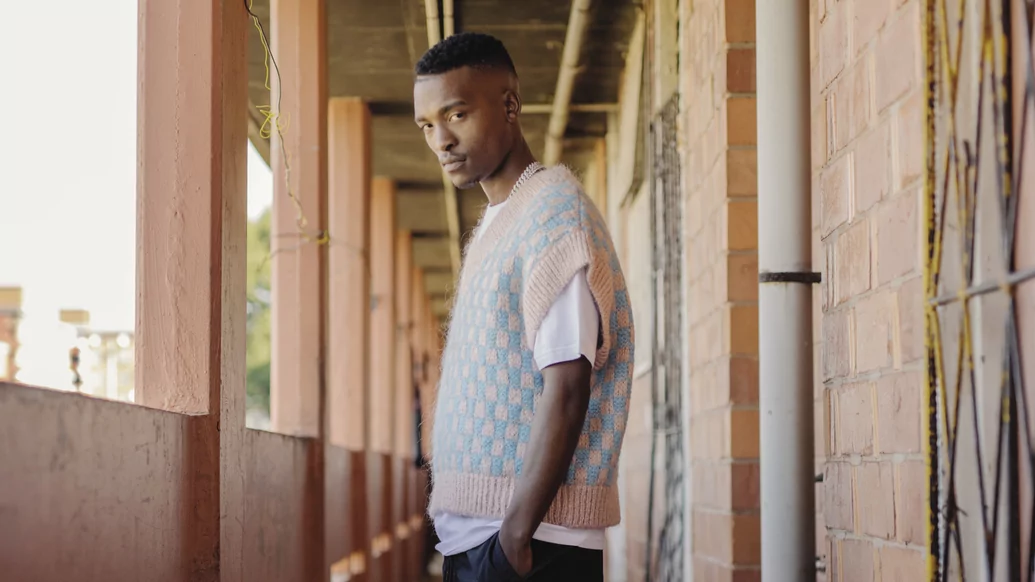
Over the pandemic, Lag had the time to pull together all the different sounds he’d picked up from years of travelling and tie them into the album. He also taught himself to play chords, and has an interest in branching out into Black Coffee’s style of Afro-tech. He purchased his first MIDI controller and has finally been able to work on the whole project in a studio, rather than cranking tunes out on his computer. Having studio access and a physical space has unlocked another realm in his production: recorded vocals.
The album features a soulful performance from Amanda Black on a beat that skilfully converts from house to gqom. Lag’s own vocals appear on several tracks, including one of his favourites, though don’t be surprised if you don’t catch it at first through the layers of studio effects. One thing that has stayed constant, though, over the years, is his choice of software. “FL Studio is the one for me. I’m never ever gonna change, I love that software, man!”
When we ask Lag if he’s worried that all these changes will evolve the sound to a point where it will no longer be gqom, he’s not concerned. “Even if gqom becomes something else, I don’t mind. Even in Asia, I heard that they are making gqom, but it sounds more like dubstep. Everybody is trying to play with it now, even some guys who are doing it in Brazil, they’re mixing gqom and baile funk — I also want to try that. It’s the broken beat that still makes it gqom. If you have those sounds and the samples, you can make a gqom track and you can add other things on top.”


Reinvigoration
Lag has big hopes for his album, beyond using it as a way to reinvigorate the gqom scene (Lag and five other gqom artists — Distruction Boyz, Funky Qla, Dlala Thuksin, Unticipated Soundz, Rudeboyz — have timed their album releases for the same time). He has also set his sights on the pinnacle of Western approval. “The first thing that I always dreamed of for this album was to get myself a Grammy or even get nominated,” he says. Apart from that, he’s looking to build up his label and work with more MCs in hip-hop and grime alike — Travis Scott and Skepta are high on his list.
Being home for so long has brought its own unique challenges. Between Covid-19 lockdowns and recent unrest in Durban, it’s been a very difficult time. But it’s also come with some welcome changes, like a move to a quiet suburb and being closer to his son and family. “It’s been four years of travelling — my son didn’t even know who I was. That was bad. But, he’s turning four next month and he’s like me! He likes music and video games.”
Lag’s time at home might soon come to an end, as festivals and major venues take tentative steps towards reopening. This autumn, he has picked up dates — there’s London’s Yam Carnival and Paris’ We Love Green, as well as elsewhere in France and Germany. Lag will also be touring his album in the UK and Europe this November. To kick it all off, as a prelude to his album, he’s also released a brand-new track on a new Goon Club Allstars label compilation.
“I just keep going and keep making music,” he says. “I want to keep the sound growing, to keep it alive.”
